Love is a funny thing.
When we are young, we are taught it is an ideal: something nigh-unattainable but precious and worthy of ardent pursuit; something intense – more powerful than any other emotion – which can triumph even over disdain or hatred; something lasting and pure, that can form a lifelong bond, stand the test of time and remain unfettered by anything circumstance throws our way...
When we get older, we learn "love" is – more often than not – rationalization people tack-on to the aftermath of lust to add a bit of garnish to simple biological impusles; that it's a gimmick – the world's oldest fad – humans engage in to spruce up the drabness of their lives; that it's a marketing ploy which gives florsists, chocolatiers and Hallmark, of all things, a much-needed annual boost...
And, in a way, both are right.
Now personally, romantic that I am, I tend to favor the former interpretation, but even if I didn't – even if I was the most jaded porker that ever squealed – I would still harbor a fondness for a good love story: all things being equal, pleasant fantasy can't help but soften the edges of a reality that doesn't live up to expectation, after all.
This is why, with Valentine's Day right around the corner, I thought I'd take the opportunity to recount some of the most notable computer game romances of the recent past. Not "best" romances, mind, because tastes run the gamut and opinions differ — but ones that were somehow unique, defied genre standards or offered a fresh perspective on the Oldest Story in the Book. And because my pig-OCD is flaring up as I'm writing, let's arrange them from the most wholesome to the most cynical... Here we go!
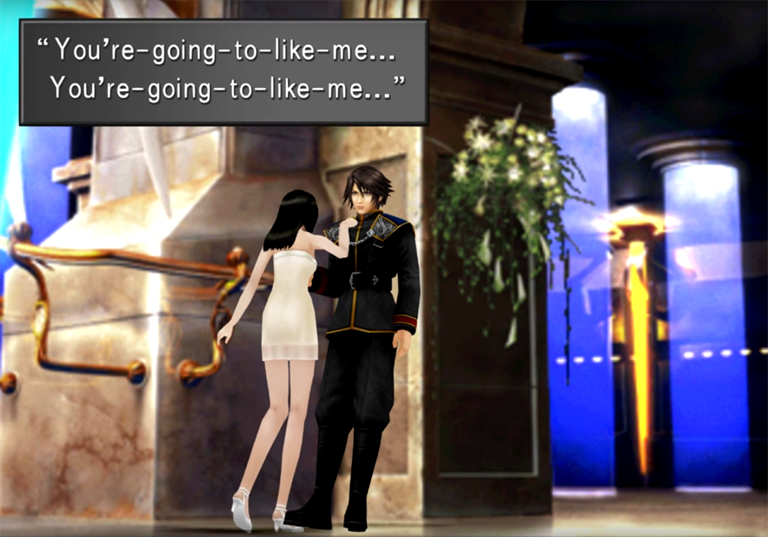
Final Fantasy VIII (1999)
"Look into my eyes... You're-going-to-like-me... You're-going-to-like-me... Did it work?" — Rinoa Heartilly
While amnesia, flashbacks and time-traveling shenanigans slightly confound the issue, Squall Leonhart and Rinoa Heartilly's romance may be as straight as a die and as wholesome as Some Other Cliché, but what it lacks in complexity it more than makes up for with Warmth and Genuine Goodness (TM).
The budding love story between the aloof boy soldier and the outgoing idealist is a slow burn that sees Squall's stoic facade gradually crumble in the face of Rinoa's playfulness and thirst for life and what starts as Just Another Mission eventually grows into an epic struggle against overwhelming odds to save a loved one.
Being able to experience the events that set the stage for Squall and Riona's meeting (through flashbacks that elucidate the relationships between Caraway, Julia, Laguna and Raine) further enhance the story and give it a bit of much-needed depth.
But, at the end of the day, FFVIII's romance is just plain nice: a straight road to the heart of the matter that might not surprise you, but will leave you feeling all fuzzy and warm every single time.
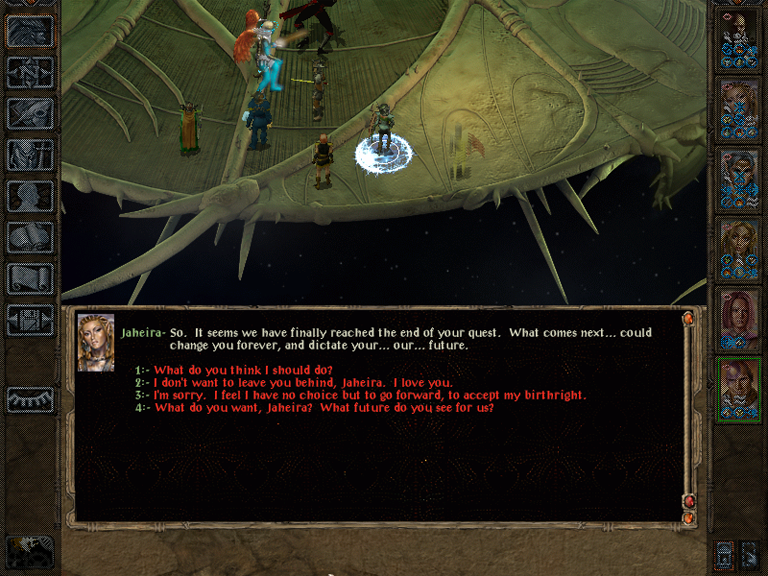
Baldur's Gate 2 (2000)
"Be aware, Mazzy, I've something long, hard and low to the ground ye're free to touch and fondle. Child, no need to glare! 'Twas me axe I were referring to." — Korgan Bloodaxe
With a balanced mix of flirtation, romance, humor and tragedy, the relationships of BG2 span the gamut while still leaning more towards the idealized end of the spectrum. From the wholesome (like Aerie and Haer'Dalis) or redemptive (Jaheira), to the tragic (Viconia), all are exceptionally written, with genuine fondness and depth — with the notable exception of Anomen, who's a bit of a wet blanket (as is, sadly, often the case for female romance options).
The neat thing about BG2 romances is how extensive and unique they are, with each throwing unexpected curves and obstacles into your path over the course of the main game and the Throne of Bhaal expansion for an experience that feels fully-realized and fulfilling by the time you finally decide whether to ascend to godhood or spend the rest of your days with the person you love.
Also, regardless of your chosen paramour, the teasing and flirtation that goes on between party members remains, to this day, unparalelled in hilarity and whether it's Imoen giving Keldorn a hard time, Jan revenge-creeping on Viconia, or – indeed – my man Korgan hitting on anything that moves, all of the little vignettes are sure to leave you smiling.
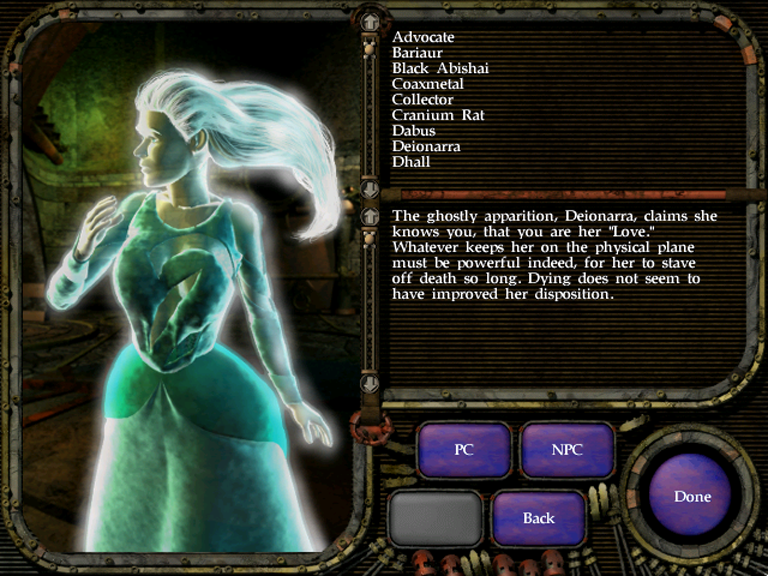
Planescape: Torment (1999)
"I shall wait for you in death's halls, my Love..." — Deionarra
While interactions with core NPCs (such as Annah and Fall-From-Grace) were never fully realized in the finished game, there's enough passion in Planescape: Torment (escpecially via Annah) to give you butterflies. But though the aforementioned pair was to be the romantic core of the game, the person who most garnered my sympathy and affection was always Deionarra: the ghost of a naive, rich girl who was so in love with the Nameless One, she not only gave her life for him but stayed devoted even beyond death.
The tale is a bit on the sad side (moreso because the Nameless One's most practical self took advantage of Deionarra for his own gain), but I've always found her enduring conviction touching.
As for Annah, the fact that she and the Nameless one must part ways right on the cusp of something sparking between them always tugged at my heartstrings. Torment definitely marks the beginning of the sway from an idealized to a more embittered (or – some might say – realistic) portrayal of romance, but it is timeless and unforgettable nonetheless.
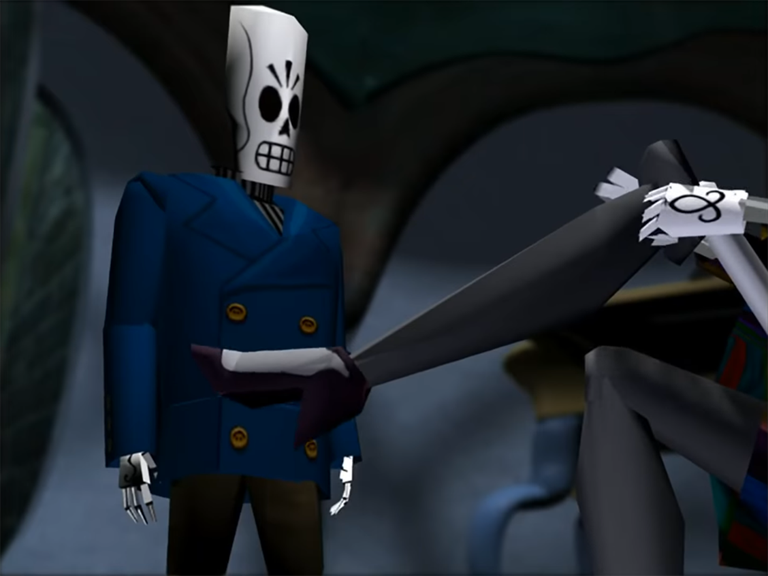
Grim Fandango (1998)
"Manny?" "Yeah?""When we get to the next world..." "What is it Angel?" "Are we going to be together?" "You know, sweetheart, if there's one thing I learned, it's this: nobody knows what's gonna happen at the end of the line, so you might as well enjoy the trip." — Mercedes Colomar and Manny Calavera
It's a story as old as time itself: boy meets girl – and they're both dead. Grim Fandango's four-year on-again, off-again noir pursuit epitomizes all the complexities of a budding romance even as it builds to a real tear-jerker of an ending. As befitting the roaring twenties in the afterlife, there's longing, passion, suspicion, doubt and more than a little heartbreak (more often than not at gunpoint).
The game metes out the romance in tantalizing little fragments punctuated by adventure and more than a little grief for an overall experience that is, somehow, quite current and – at the same time – poignantly nostalgic.
And the best thing about it? Untrammeled as they are by material posessions, social standing or even appearance, what Manny and Meche experience is love in its purest form: a sentiment born solely out of mutual attraction to their innermost selves...
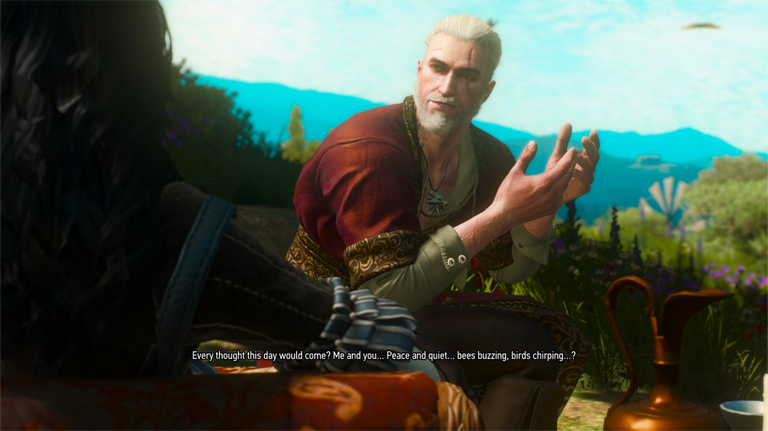
Witcher 3: Wild Hunt (2015)
"Life might be black and white to you Witchers, but to us common folk it's all just shades of grey." — Baron Phillip Strenger
Standing squarely in the middle of our scale is the fulcrum that is Witcher 3: a game all about compromises between aspirations and reality, which offers the most balanced view of human interaction that, naturally, extends to romance as well.
Trapped as he is between a Love He Doesn't Remember (which may not be real to begin with); and a Romance He Shouldn't Have Indulged (but, possibly, did anyway), Geralt of Rivia, protagonist and titular witcher, may have a dilemma on his hands – but that's not enough to stop him from being the Quintessential Male and fooling around.
So while, in his heart of hearts, he may waver between the tragic and capricious Yennefer of Vengerberg and her conflicted friend Triss Merigold, he also has no compunctions about pursuing other relationships in the meantime. The game is well enough written not to trivialize these encounters and delivers an experience that sees love as a normal, everyday emotion: meant to be pursued and cherished, but no more important than lust, duty or obligation.
For a game that, at its core, is a multi-tiered love story, Witcher 3: Wild Hunt has a pleasing level-headedness to it which evokes all the right emotions without slathering excess fluff.
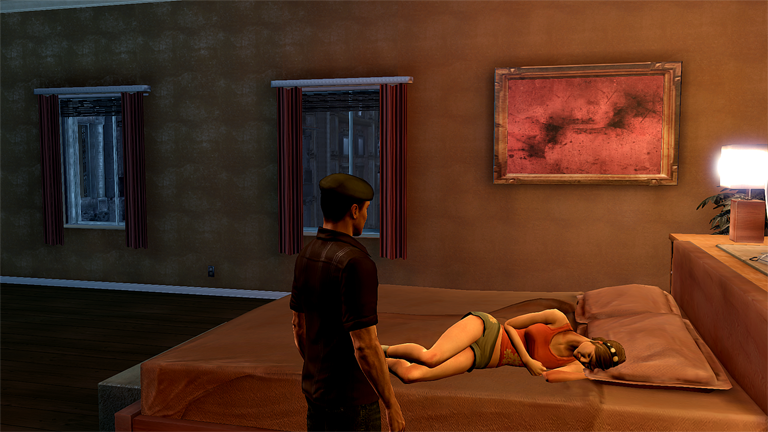
Alpha Protocol (2010)
"Love's not enough. Love can't save her – remember that James? Love is not enough." — James O'Malley's stepfather
Because of its episodic nature and spy-thriller core, relationships in Alpha Protocol range from the natural and expected (Mina Tang), to surprising (Scarlett Lake) and downright hilarious (SIE), but the real showstopper (for me, at least) was, is and always will be Madison Saint James.
Unlike the other romanceable characters, Madison is not a handler, "reporter" or mercenary: she's just an office worker caught in the middle of something she's not cut out for. And while her ordinary nature makes for a different sort of relationship, it also sets the stage for an uncomfortable, unsalvageable conclusion that can result only in death or disdain.
Call me cynical, but I liked the fact that Madison's arc couldn't be salvaged. In a field full of happy endings and unsurprising resolutions here was a story that just Couldn't. End. Well. Because, powerful though it is, love is just an emotion. And, sometimes, emotions just aren't enough.
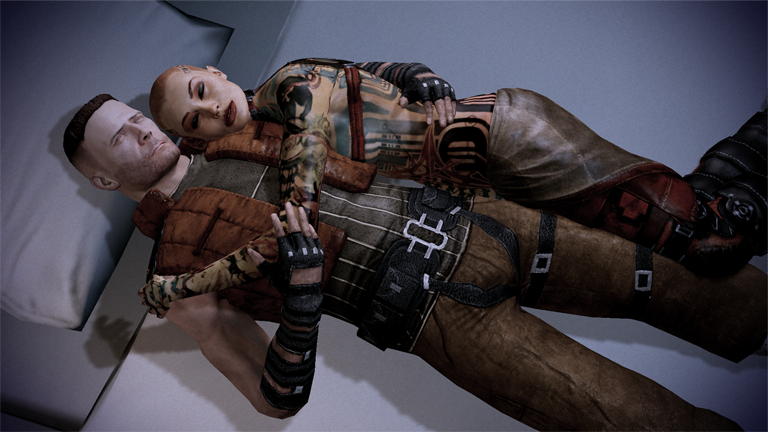
Mass Effect 2 (2010)
"You let someone get that close, it just means they need a shorter knife. Lonely and alive works just fine, thanks." — Jack
While, as befitting a BioWare Production, romance options permeated every installment of the Mass Effect saga, nowhere were they better realized than in the Jack romance during Mass Effect 2.
While all other characters were largely formulaic, Jack epitomized a stark departure in two endearing ways. First, she had an edge to her. This wasn't some cookie-cutter BioWare virgin: Jack'd been around and was wholly unrepentant for how she played the cards she'd been dealt. She'd suffered, screwed and killed her way to the present and saw nothing to be ashamed of.
Second, Jack's romance was the only one that could be resolved badly. And I don't mean "chosen to be abandoned or left unfinished" – I mean you could genuinely hurt her; betray her trust. Something a BioWare game had never attempted before (or, far as I know, since). And while the option was best left unexplored (unless, I don't know: you get a kick out of bad decisions, I guess?); it's presence was a refreshing take on largely stale subject matter and remains my favorite romance of the series.
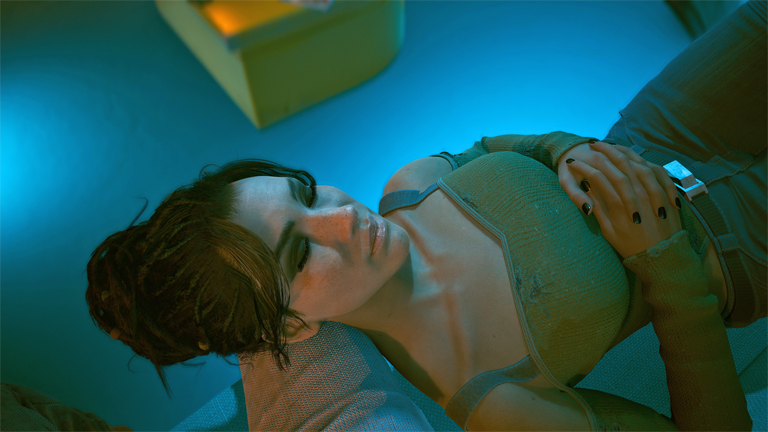
Cyberpunk 2077 (2020)
"Your body can be chrome, but the heart never changes. It wants what it wants." — Lizzy Wizzy
For the most realistic portrayal of romance that, almost uniformly, Doesn't End Well, we need look no further than the cynic's wet-dream that is Cyberpunk 2077.
Here, relationships work much in the way they do in Real Life: you're brought together by a common purpose, intimacy and sex are largely a result of convenience and whatever Finer Feelings you accumulate along the way aren't enough to sway the ultimate outcome. Characters follow their own hearts and will leave you high and dry the minute your outlook misaligns with theirs.
That said, even in a setting as cruel and unforgiving as CP2077 (or maybe in spite of it), love and romance offer a much needed glimpse of brighter prospects beyond the immediate tumult. Also (imitating the greatness that is ME2) once the tumult is out of the way, you can snuggle on a couch.
Couch-snuggling is always a plus.
Honorable mention: Dragon's Dogma (2012)
Existing off on a crazy tangent to the side of the spectrum is the weirdness that is Dragon's Dogma, which – in lieu of quest flags or branching dialogue – decided to resolve it's romance options with arbitrary Affinity Points.
What this means, in practice, is that you're not really sure whom it is you'll end up with past a certain point, as the game doesn't let on how many Affinity Points you have and how they're distributed. Between quests that award 'em, gifts that can raise 'em and the fact that some key characters can die, you're never really certain what you're in for, which makes the game an outlier of sorts – if not in the best way.
If you enjoy blind dates or Russian roulette happens to be your favorite pastime, do give the romance in Dragon's Dogma a go. It's not all that fulfilling, but – boy – is it original!
